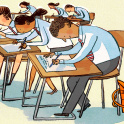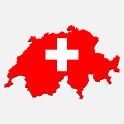Boarding schools in Switzerland

This global reputation started in the first half of the 20th century. The rigorous International Baccalaureate Diploma Programme (IBDP) is commonplace today but these institutions’ roots are considerably less academic and lie in Swiss finishing schools. These were designed to teach young ladies of certain privileged backgrounds etiquette and protocol, the art of dining (not how to cook but eat, lay the table, where to sit people etc), household management (how to deal with servants) and a little bit of French (as most were located in Vaud, around Lake Geneva, in the French-speaking part of Switzerland).
One of the best known was Institut Alpin Videmanette in Rougemont attended by Diana Princess of Wales in 1977-78, just after she had been introduced to Prince Charles, and also attended by her sons’ nanny Tiggy Legge-Bourke. Here, the girls would hope to meet ‘the right boy’ from Le Rosey when the boys were on their winter retreat in nearby Gstaad.
Brillantmont, in Lausanne, which is now a co-ed international boarding school, was founded as a finishing school back in 1882 – while Château Mont-Choisi, just outside Lausanne, educated Carla Bruni-Sarkozy among others. The 1960s saw most of these closed, although Institut Villa Pierrefeu, in Glion, still survives today.
There are currently over 30 boarding schools throughout Switzerland if you include schools with tiny boarding facilities or weekly boarding (useful for families who live in more remote areas or because the school is in the catchment area of a big international company that may move parents at the drop of a hat). These schools are still mainly in the French-speaking part, but a few reside in the German-speaking part with just one, TASIS, in the Italian-speaking part of Switzerland. Strictly speaking, Lyceum Alpinum Zuoz is in the Romansch-speaking area of Switzerland, but since Romansch is only taught at primary school perhaps that does not quite count.
Swiss boarding schools tend to be small, hence the more personalised education that makes them so desirable. This also often results in buildings housing both boarding accommodation and teaching facilities, so it is common for students to literally live above their classrooms.
As one would expect, some of the schools’ buildings and architecture reflect their location. For example, part of Leysin American School, in the Vaud alps, is housed in the old Belle Epoque building of the Grand Hotel, built for Tuberculosis patients in 1892. Institut Montana Zugerberg overlooking Lake Zug, in the eastern part of Switzerland, is also housed in an old hotel. The Aiglon College campus, also in the Vaud alps, is made up of various sized typical Swiss wooden chalets clinging to the mountainside, while the TASIS school buildings, overlooking Lake Lugano, are modelled on a traditional Italian village.
Why do families choose boarding schools in Switzerland?
There are many reasons why families choose to send their children to Swiss boarding schools: political stability, safety, quality of education, engaging academic and non-academic activities, the opportunity to become fluent in English (and hopefully another non-mother tongue European language), a multicultural environment, personal development and of course the beautiful landscape (whether lake, mountains or both) and fresh air. In addition, everyone is welcome, whatever your nationality or family background.
But the ultimate pull is the personalised education these schools provide, whether compared with a British boarding school or international Swiss day school. For example, the student to teacher ratio at Institut auf dem Rosenberg is 2:1 with an average of eight students per class. This would compare to a teacher ratio of about 8:1 in most British boarding schools.
For many parents it is also the attraction of the IB diploma which is offered by about two-thirds of all Swiss boarding schools. The IBDP is accepted by universities around the world, although ironically Swiss universities require much higher entrance requirements from IBDP students than many other countries, despite the qualification being created in Switzerland by the International School of Geneva. Although this is a highly rigorous qualification, and not suitable for all students, schools can offer the individual subjects as certificates or courses, and most of the schools offer a US high school diploma.
There are also three schools that offer the IB Career-related Programme (IBCP): College du Leman (CDL) in Geneva, Haut-Lac above Vevey and the International School Altdorf in remote Uri canton. Interestingly, all three schools offer either hospitality or tourism management as an option, subjects closely related to Switzerland. Altdorf collaborates with Bella Vista Institute of Higher Education Switzerland in Altdorf to offer the British OTHM Level 3 Foundation Diploma for Higher Education Studies as an alternative qualification to UK and other universities, and the BTEC for the IBCP.
Going back 20 years or so, nearly all Swiss boarding schools would have offered A levels, although only four now do so: Brillantmont, Chantemerle (above Vevey), Institut auf dem Rosenberg and Swiss Boarding Schools Disentis & Zurich, although a number do offer IGCSEs at the end of year 11 (grade 10) in a wide range of subjects including language mother tongue options.
Only 10 schools offer the Swiss Maturité in their local language of either French or German. Although well recognised by universities across Europe for its rigorous curriculum, it is less acceptable to those in the UK and US. However, while seven schools offer APs, only CDL, TASIS and Institut auf dem Rosenberg offer a wide range of subject choices. The prestigious Le Rosey, along with CDL, College Champittet and Lemania, both outside Lausanne, also offer the French Baccalaureate.
Learning support
The official amount of learning support offered to SEN students varies hugely within these schools. For instance, Le Rosey will not accept any student with a learning difficulty, whereas others have specialist teachers as part of a learning support team, eg CDL, Leysin American School (LAS), Aiglon, Beau Soleil and St George’s.
Language learning
All boarding schools offer special and extended support for students to learn English as it tends to be the main language of tuition. Schools also provide support for students to continue studying in their native languages (often Russian, Arabic and Mandarin) at IGCSE and IB diploma level, even if they are way up in the mountains, as the IB offers language and literature in 55 languages. Other languages can be studied online.
Outdoor education
Not surprisingly, all boarding schools offer winter sports, the most popular being skiing and snowboarding although some students, if at international level, may opt for skating. During the season this is often one whole day during the week, plus weekends, even for those studying the rigorous IB diploma, Swiss Maturité and French Baccalaureate. Or for something different, the International School of Schaffhausen and Institut auf dem Rosenberg encourage students to join the local ice hockey teams.
Some parents deliberately choose schools that are in the famous ski resorts of Verbier or Crans Montana, such as Verbier International or Le Regent. Not to be outdone, Le Rosey famously moves campus from Rolle to Gstaad from January to March every year. But even those not actually located in the mountains, such as CDL and St Georges, will usually offer a ski week during the season in place of half term.
Some schools offer the demanding Duke of Edinburgh International Award. These include TASIS, St Georges and Le Rosey. Aiglon College and College Alpin Beau Soleil in Vaud are Round Square schools where termly expeditions are compulsory for all students.
Switzerland offers many weekend activities for boarders throughout the year too. Institut Montana Zugerberg even has a downhill mountain bike course.
Social cache, networks and alumni
The networking opportunities for both parents and students are a huge draw and one of the main reasons why so many of these schools are filled with the children and grandchildren of alumni. It is not uncommon to hear students say that they were desperate to start, having heard the stories from mum, dad, grandma or grandpa. At the most prestigious schools, students will likely rub shoulders with the offspring of various royal families, as well as the nouvelle riche.
Anything else?
Unfortunately, some parents believe that sending their teenagers to a school up a mountain will exclude the temptations of city dwelling students of the same age. But despite strong – and in some cases draconian – drug and alcohol policies, these opportunities do not go away, particularly if said child brings a car to school. However, it is often true that the small, safe and personal nature of these schools ‘bring out the best in troublesome teenagers’.
Parents may also choose Switzerland for safety reasons. After all, Swiss boarding schools did very well when the Italian mafia were threatening the safety of wealthy Italian families. In addition, some families may choose weekly boarding if they live in a part of Switzerland where there is not an appropriate school, particularly given the lack of SEN support in local Swiss schools. Or parents of day students may choose a small, more rural boarding school over the larger city-based international day schools.
Who does Swiss boarding school suit?
There is no ‘type’ of Swiss boarding school student. Some attend because they were bullied at or expelled from an international day-school in Switzerland or elsewhere, while many of the teenage girls that arrive in year 11 (grade 10) desperately wanted to go to boarding school and the parents picked Switzerland for the reasons stated above (or they chose it themselves because they'd heard about their reputation). That said, the overriding reason tends to be the opportunity to learn to communicate in English fluently.
A young person who is more passionate about the outdoors and extreme sports than they are about academics and learning may fit in very well to many of the schools. However, one element that may surprise some teenagers who are keen to move away from home, is that they will likely have to share a room and bathroom facilities. There are usually single bedroom ensuites available, but they come at a price.
How much do Swiss boarding schools cost?
At the top end, the cost of Swiss boarding schools rivals that of a Ferrari Portofino V8. Plus the uniform (only worn on rare occasions), sports kit and pocket money.
And don’t forget that costs of trips, exams, extra tuition and even university guidance will be extra. Plus, ‘Personal expenses will be charged at the end of each term’. So the sky is the limit. If you are a bit more budget conscious, then there are schools available for the price of an Audi S8. However, across the board Swiss boarding schools are still a considerably more expensive option than the UK, even after the recent addition of VAT!
Note that some schools, in particular Aiglon, offer scholarships for exceptional students and the school’s university advisors often follow this through to tertiary level.
The last word
Swiss boarding schools are not academic powerhouses that churn out Oxbridge and Ivy League students by the dozen. Students do go on to Ivy League and other top US universities, in part because the Ivy Leaguers have probably got a family legacy, while others head to Oxbridge and top universities around the world. And yes, the schools do usually achieve above world average results from their students because of the small class sizes, which allows more personalised teaching and enable students get through the curriculum faster, leaving plenty of time for revision and past papers in class. In addition, because of their small size with a captured audience of students and staff, it is easier to provide extra tutoring and learning support.
Parents who might struggle to pay the fees or provide eye-watering levels of pocket-money should perhaps look elsewhere as Swiss boarding schools are for a different type of elite. That said, the alumni leave with a sense of purpose and responsibility to make the world a better place, alongside a certain social poise that makes them stand-out amongst their less privileged peers.
Featured in: International education advice Switzerland
Tags: Boarding Schools International Baccalaureate Bilingual


